- Home
- Patrick Ness
Joyride Page 5
Joyride Read online
Page 5
What’s going on?
He squints, rubs his face, trying to clear his vision but failing. There’s a circle of ten couches like his. Only one other is occupied. A woman dressed in a bright purple dress. Ridiculously pointed high heels aim upwards like overpriced leather arrows.
He moves over to her. She looks to be asleep, her face twitching every now and then. She’s wearing a headset, the same as the one he took off when he first woke up. The wires from it stretch into the pipes and he follows them using his fingers, moving to the middle of the room where they’re connected to a pyramid of flashing lights and metal.
He moves over to take a look at it, stumbling slightly from the sensation of this wrong body, the way it swings, the way it hangs, the way it feels.
Seriously now. What’s going on?
The pyramid is some kind of machine. He looms over it, trying to get close enough to see it properly. No visible switches, just pulsing lights dancing over a dull-chrome surface.
I was plugged into that, he thinks. And somehow it’s changed me. It’s turned me into . . .
Moving round the pyramid, he’s now facing a panel that’s reflective, and the face looking back at him is that of a man in his fifties. Hair greying, skin pale and unhealthy, jowls hanging. He even has a moustache. A moustache for God’s sake.
‘Shut up,’ he says and again, the voice is off but he can see why now, it’s not his voice.
He stares at the face for quite a long time. Pulling different expressions, widening those bloodshot eyes, thinning those puffy lips. He pokes the face with an index finger that shouldn’t be attached to him. Those nails are bitten, he thinks, bitten sore. Every poke of the finger registers, he feels it. He feels the finger that isn’t his touch the face that isn’t his. As the concept of that really sinks in, he watches the face that isn’t his pull a sneer and, finally, he recognises something of his own.
What’s the last thing he can remember? And why is it so hard to think?
Walking. Yes. High Street. Staring at the sheet of plastic plastered over the betting shop window. Police signs and bouquets of flowers. Like the dead will rest easier thanks to cheap garage-forecourt blooms. Heading to school.
Yes. But not getting there. Why didn’t he get there? And where’s here?
He looks around again. The benches, the machine, the wires, the woman in the purple dress. Should he wake her up? Ask her what the hell is going on? Did she used to be someone else? Will she stare at her face and not know it?
Outside. He needs to find someone else. Whoever it is that’s behind all this. Machines like this don’t just work themselves. Someone is doing this. Someone’s in charge.
He looks around for a door, but his blurred vision makes it hard. It would help if there were more lights. It would help if his head would just stop hurting.
He bumps into one of the benches, not used to moving in this body, and falls to the ground, slamming his palms on the stone floor. It hurts. These palms, hot and sore from the impact, these shoulders, jolted by the impact. Not his palms, not his shoulders, and yet he gets to own the pain—how twisted is that?
Something has fallen out of his pocket. (‘No! Not my pocket, none of this is mine!’) He picks it up and gets to his feet. It’s a glasses case. He opens it, expensive designer glasses, thin metal frames. He thinks for a minute then decides, to hell with it, why not? He puts the glasses on.
Now he can see clearly. Of course he can, because this body—this old, fat, stupid body—is also shortsighted.
It makes all the difference; the door is right in front of him, a few feet away in the shadows. He walks over to it, turns the handle, and is relieved to find it’s not locked.
Outside, he’s in a narrow corridor and there’s the sound of music playing to his left. Where is he? Everywhere’s tatty, a brown explosion of damp on peeling, painted breeze-block walls. The floor is swept clean but ancient scrape marks and the stained lines of dirty trolley wheels cut across it. Some sort of storage place? A warehouse? It looks like it hasn’t seen any proper business for years, but he knows that’s not true because he’s in it and he’s not alone.
He moves towards the sound of music.
The corridor opens out into a reception area. The glass frontage has been whitewashed over so he can’t see outside, can’t get an idea of where this place is. In the reception area there’s a single desk, a computer (that’s where the music’s coming from, old man’s guitar rock, all power chords and eighties synths), and a man leaning back in an office chair, his feet resting on the desk.
He has a choice.
He could ask this man what’s going on. That’s the obvious thing to do. Thing is, he’s just woken up inside a body that’s not his in a knackered old building, and what part of any of that is right? What part of it strikes you as something that should be happening? This is probably a weird experiment or something. He’s not supposed to be here. He hasn’t asked to be here, overweight, old, and half blind. So is talking to this bloke, this relaxing man listening to his bad music, going to make the situation worse? ‘Hello, mate, I wonder if you can help? I’ve woken up in the middle of your illegal science experiment and I was wondering if you could sort my body out and point me towards the closest bus stop?’
No. That’s just not going to play, is it? That’s not getting him anywhere useful.
So what does he do? Does he grab the bloke and force him to tell him? Can he even do that? The man doesn’t look particularly threatening. Shirt and trousers, tie slung loose. Forty? Maybe a little bit younger. He looks like a salesman for a particularly dull company. On any other day, Ram would give it a go. Today, however . . . today he is stuck in the body of a man that he doesn’t know. He just lost a short fight with a bench. He’s big, but is that enough?
Ram decides it’ll have to be, which is when the man sees a reflection in his computer monitor and turns around. His response is not at all what Ram expects.
‘Sir!’ The man jumps to his feet, knocking an empty mug off the desk causing himself a dilemma. He doesn’t know what to do next, smarten himself up or pick up the mug. He tries both, the sum result of which is a man with a twisted tie holding a mug the wrong way up. ‘I was told you wouldn’t be up and about for at least another couple of hours. I’m so sorry.’
He suddenly remembers the music, spins round, and tries to turn it off, stabbing at the keyboard shortcuts, briefly making it play louder, then silencing it. He turns back to face Ram who, with all of this confusion, still hasn’t quite decided what to say next.
‘Right,’ he says and then a huge, horrible chunk of silence swells between them. Luckily for Ram, the other man comes to the rescue.
‘Bit disorientated, yes?’ he asks. ‘It can take a good ten minutes to find your feet. That’s what Mr Fletcher tells me anyway, I haven’t been able to try it out myself. Not on what he pays me!’ The man laughs then, but only briefly as he suddenly realises what he’s said might be taken as rude.
‘Which is only right, of course,’ he continues, ‘because Joyriders is an extremely exclusive enterprise. Obviously.’
He draws to a halt and Ram finally understands that this man is just as uncomfortable in his own way as he is. Sure, he hasn’t just woken up in a strange body but he’s clearly terrified, and if Ram can just keep it together, there’s a chance he can get the upper hand.
‘Disorientated,’ he says, just managing not to wince again at the strange sound of his new voice. ‘Yeah. Very. Head’s splitting actually. Can’t really think straight.’
‘What am I thinking?’ The man grabs his desk chair and wheels it over. ‘Sit down, please. Can I get you some water, maybe? I can’t give you any pills or anything, for the headache, I mean, we’re not allowed.’ He stares down at the chair, hating how absurd it now looks stranded in the middle of the room but not knowing what else to do.
‘Health and safety, I suppose!’ He laughs again. ‘Some people are allergic, aren’t they?’
Ram jus
t nods and sits down. ‘Some water would be great, thanks.’
As the man dashes over to a watercooler, faffing in panic as he notices that he needs to find a fresh pack of plastic cups, Ram sits but immediately regrets it—he doesn’t want to be there. He wants to be out of the front door and legging it up the road. Or does he? This body probably isn’t going to just fall off if he runs fast enough. He needs to figure out what’s happened.
The man comes back with a cup of water. ‘Here you go. It’s cold.’ He says this as if it’s the most important thing in the world, as if the temperature of the water is the glue that will bind all of his professionalism back together.
‘Thanks.’ Ram drinks, mainly to buy him a bit more time to think. ‘Mr Fletcher . . .’ he says in as noncommittal a way as possible, hoping it just might lead to something. It does, but it’s not good.
‘Yeah, he just had to pop out for a bit.’ The man checks his watch. ‘In fact he should be back any minute.’
Ram doesn’t like the sound of that, because Mr Fletcher is obviously the boss, and there’s no way he’s going to be on the back foot as much as this guy.
‘Right,’ he says. ‘Good.’ Think, Ram! Think!
Joyriders. That’s what the man called this (and, of course, he can’t stop the sudden image of Poppy flashing into his head, imagining her as she speeds towards that brick wall and death). That name, and the things that have happened, bring an awful thought to mind. He hasn’t been changed. This man doesn’t think he’s Ram Singh. He thinks he’s someone else—he thinks he’s the man who looks like this. The man who owns this body.
So what does that mean? The obvious answer—and the fact that Ram even considers this obvious is a sign of how screwed-up his life has become of late—is that they’ve somehow swapped places. Like that truly horrible Ryan Reynolds movie, where he swaps with Jason Bateman. Except in the movie, Bateman gets to be Ryan Reynolds and somehow decides not to have sex with Olivia Wilde. By comparison, he’s stuck here drinking water with Eighties Rock while wearing the body of an old guy. Life really sucks.
Is that what this is? Really? And if it is, then what the hell is old fat guy doing while he’s in Ram’s body? Is he going to have anything to swap back into? Hopefully he’s sleeping with Olivia Wilde.
‘So,’ he says, ‘something obviously went wrong.’ Eighties Rock stares at him but for once says nothing.
Ram continues digging. ‘You said I should have stayed asleep for another couple of hours?’
‘Well, not asleep exactly, obviously, but, yeah, you paid for a full session so . . .’ He checks his watch again. ‘You should have transferred back at two o’clock.’ He suddenly realises he might be fielding a customer service complaint.
‘I’m sure Mr Fletcher will sort it though. You’ve paid for the full session and you’ll get it. Definitely.’
‘Great,’ says Ram, trying to sound angry, which he is, just not for the reasons Eighties Rock would guess. ‘Definitely. Full session. I paid, yeah?’
‘Erm . . .’ The man is looking at him. Ram wonders if he’s sounding strange. This is the man’s voice he’s using but for all he knows the guy could have been American or something. Would he lose his accent with a different brain in place?
‘Well, as long as it’s sorted out,’ he says, figuring he may as well keep digging as stop, ‘that’s fine.’
So much is going through his head, he just doesn’t know what to do.
If somebody else is running around in his body, they could be doing anything to it. Should he get out of here now, while he can? Or should he wait for the boss to get back so that he stands a chance of being swapped back? Can he be swapped back?
What should he do?
‘I think I’ll get a bit of fresh air,’ he says. ‘Maybe clear my head a bit.’
Because even if he doesn’t decide to run, at least he’ll then have some idea of where this is. Maybe, if they are swapped back, he can come back later, with a few friends in tow, and see about sorting this lot out. (A few friends, yeah, like I have any of those, posh boy and the freak kids, what a great army they make.)
‘Oh . . .’ Eighties Rock clearly isn’t sure about this, but he hasn’t quite got the balls to flat-out deny him.
‘For goodness’ sake, man,’ Ram says, trying his best to sound old and fat, ‘I’m hardly going to run off, am I? You still owe me, remember?’
Eighties Rock nods. ‘Of course, sorry, it’s just . . . well, you know the rules.’
No, thinks Ram, that’s the problem; I don’t.
‘Given what’s happened,’ he says, ‘I think we can bend the rules a bit, don’t you? I just want to clear my head a bit, is that too much to ask?’
‘No, of course not, it’s just . . . Well, Mr Fletcher is very strict about this, you know that, and if he were to know that I’d just let you go outside . . .’
‘Well, he doesn’t have to know, does he?’ Ram tries to offer what he hopes looks like a friendly smile. ‘I won’t tell him if you don’t.’
But Ram has clearly found the thing that truly terrifies Eighties Rock: his boss. ‘Sorry, but no, I really couldn’t.’
Ram makes a decision. ‘Fine’—he makes a run for the door—‘then you can tell him you tried to stop me.’
Eighties Rock panics but, despite Ram’s awkwardness with this borrowed body, he gets to the door before Eighties Rock can stop him. It’s just a shame that that’s when Garry Fletcher steps through it.
‘Oh.’ Fletcher is clearly surprised to see him. ‘Is there a problem?’
‘I told him he wasn’t allowed outside, Mr Fletcher,’ says Eighties Rock, desperate to cover his arse before they get down to details.
‘Yeah,’ says Ram, ‘but I want some fresh air and I’m the paying customer here, so if you don’t mind getting out of my way.’
‘But now that Mr Fletcher is here we can see what went wrong,’ says Eighties Rock.
‘In a minute!’ shouts Ram, losing his cool, the half-open doorway within reach. ‘First I want to get some fresh air!’
‘If fresh air is what you want, Mr Spencer,’ says Fletcher, ‘then fresh air is what you shall have.’ He stands out of the way.
Ram can’t quite believe it. ‘I should think so too!’ he says and reaches for the door.
‘Oh,’ says Fletcher, ‘one more thing, Mr Spencer . . .’
‘Yes?’ Ram asks, turning just in time to see Fletcher’s fist raising.
‘Your name,’ Fletcher says. ‘It’s not Mr Spencer.’
TWELVE
GARRY, OLD SON, YOU JUST BECAME A MILLIONAIRE
Six months earlier . . .
‘Yeah,’ says Garry Fletcher, ‘but your girlfriend’s still a bit of a dog, isn’t she?’
Fans of intellectual debate and reasoned discourse don’t often frequent the front bar of the Pig & Lettuce. There, where the carpets are bald and the bar sticky, a simpler form of interaction is favoured. Say what you like about the conversation though, a student of physics, even one of Quill’s more reluctant pupils, would learn something over the course of an evening.
Fletcher’s comment, for example, and the punch that comes by swift reply, offer a master class of force in motion. Cause and effect, momentum, and finally gravity are all illustrated as Fletcher sails through a small collection of bar stools and comes to rest beneath the table of an old couple.
The couple don’t bat an eye when Fletcher is dragged out from between their feet and thrown through the main double doors onto the wet street outside. If pressed they would simply mutter, ‘No business of ours,’ and look to Stan, the manager, for another pint of stout and a rum and Coke.
Fletcher is flat on his stomach, balancing on the lip of the kerb like a man riding the roof of a moving train. He spits blood into a puddle and decides that maybe it’s time to head home.
He gets up, does his best to straighten his tie, and begins limping off in search of bus stops. From experience, this is likely to be a heroic journey. He’s
convinced the council move the things at night. Or maybe it’s Ranesh at the local kebab shop, knowing that he’s bound to get hungry as he wanders lost, trying to get home.
‘Ranesh,’ Fletcher mutters, ‘if he thinks he’s getting my money tonight for doner and chips, he’s out of luck.’
Of course, just the act of imagining the food, sweating together in the sauna of its polystyrene box, is enough to make him change his mind and he hovers at the corner of the street weighing up his choices.
‘Excuse me?’
Fletcher looks around for the voice, not entirely convinced it’s not in his head.
‘Can you help me?’ the voice asks, and Fletcher finally pins it down. There’s a kid on the other side of the street. He’s ten or eleven, barefoot, and dressed in a mismatched tracksuit. Aye, aye, Fletcher thinks, this is probably trouble.
He’s right, though it won’t be trouble for Fletcher—not in the short term.
‘You’ve got no shoes,’ he says, shuffling across the road. ‘Why’ve you got no shoes?’ This seems the biggest problem to Fletcher and he’s hoping the kid isn’t going to ask to borrow his. They’re cheap, and the sole of the left one is now so thin the shoe could function as a lampshade, but they’re his and he wants to keep them.
‘That doesn’t matter,’ says the kid, ‘I just need your help.’
‘What with?’ Fletcher asks, walking past the boy slightly so he can sit on the low wall that skirts the pavement. ‘I haven’t got any money.’
This isn’t true; he’s got well over a hundred quid in his pocket. It’s a little private bonus that he’s skimmed off the top after his usual day of flogging meat to restaurants and pubs. He sees nothing wrong in this. In fact, he’s decided it’s the simplest way of pleasing everybody. His boss is happy because he thinks he gets Fletcher’s services for twenty grand a year, Fletcher is happy because, actually, his boss doesn’t. This is simple morality in the world of Garry Fletcher.

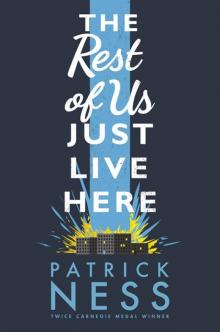 The Rest of Us Just Live Here
The Rest of Us Just Live Here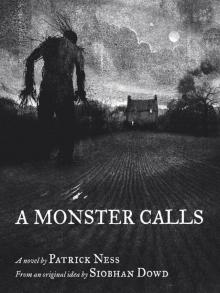 A Monster Calls
A Monster Calls The Crane Wife
The Crane Wife Release
Release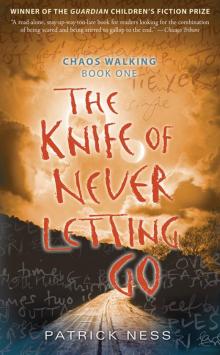 The Knife of Never Letting Go
The Knife of Never Letting Go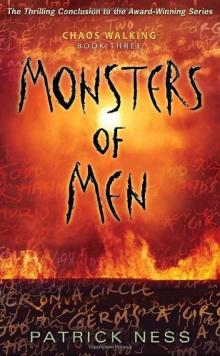 Monsters of Men
Monsters of Men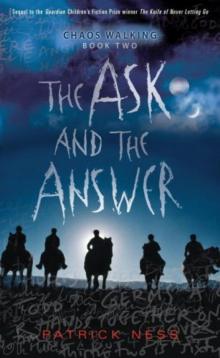 The Ask and the Answer
The Ask and the Answer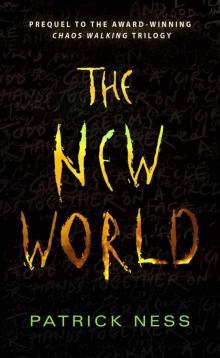 The New World
The New World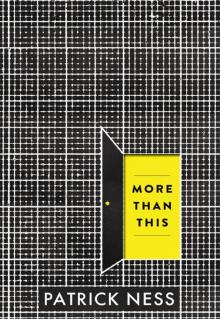 More Than This
More Than This Burn
Burn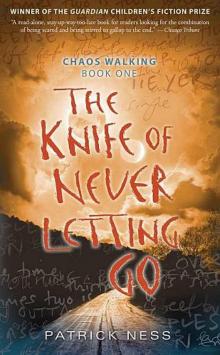 The Knife of Never Letting Go cw-1
The Knife of Never Letting Go cw-1 Topics About Which I Know Nothing
Topics About Which I Know Nothing And The Ocean Was Our Sky
And The Ocean Was Our Sky The Stone House
The Stone House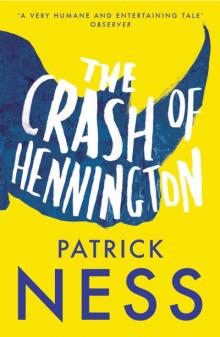 The Crash of Hennington
The Crash of Hennington Joyride
Joyride What She Does Next Will Astound You
What She Does Next Will Astound You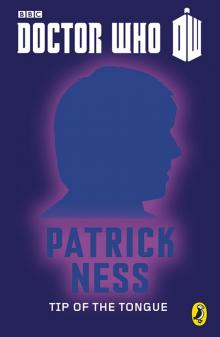 Tip Of The Tongue
Tip Of The Tongue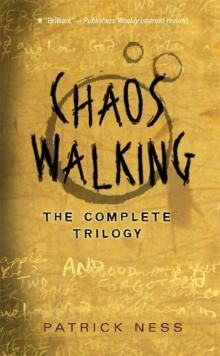 Chaos Walking
Chaos Walking